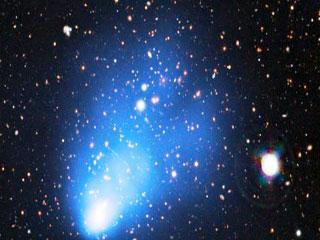
The two merging clusters of El Gordo can be seen separated by a bright field of X-ray light. Photo: ESO.
TEXAS (BNS): Scientists have discovered a new galaxy cluster - the largest ever seen in the distant Universe - by using ESO's Very Large Telescope (VLT) along with NASA's Chandra X-ray Observatory and the Atacama Cosmology Telescope.
The newly discovered galaxy cluster has been nicknamed El Gordo the "big" or "fat one" in Spanish.
It consists of two separate galaxy subclusters colliding at several million kilometres per hour, and is so far away that its light has travelled for seven billion years to reach the Earth.
"This cluster is the most massive, the hottest, and gives off the most X-rays of any cluster found so far at this distance or beyond," Felipe Menanteau of Rutgers University, who led the study, said.
According to ESO, clusters of galaxies are the largest objects in the Universe held together by gravity. The process of their formation, when smaller groups of galaxies merge together, very much depends on the amount of dark matter and dark energy in the Universe at that time, so studying clusters can shed some light on these mysterious components of the cosmos.
The team, led by Chilean and Rutgers astronomers, found El Gordo by detecting a distortion of the cosmic microwave background radiation. This faint glow is the remnant of the first light from the Big Bang, the extremely hot and dense origin of the Universe about 13.7 billion years ago.
This radiation left over from the Big Bang interacts with electrons in the hot gas in galaxy clusters, distorting the appearance of the background glow seen from Earth .The denser and bigger the cluster, the bigger this effect. El Gordo was picked up in a survey of the microwave background with the Atacama Cosmology Telescope.
ESO's Very Large Telescope was used by the team to measure the velocities of the galaxies in this huge cluster collision and also to measure its distance from Earth. In addition NASA's Chandra X-ray Observatory was used to study the hot gas in the cluster.
El Gordo most probably formed just like the Bullet Cluster, a spectacular interacting cluster of galaxies that is almost four billion light-years closer to Earth. In both clusters there is evidence that normal matter, mainly composed of hot, X-ray-bright gas, has been wrenched apart from the dark matter. The hot gas was slowed down by the collision, but the dark matter was not.
 Next Article
Next Article












The Indian Air Force, in its flight trials evaluation report submitted before the Defence Ministry l..
view articleAn insight into the Medium Multi-Role Combat Aircraft competition...
view articleSky enthusiasts can now spot the International Space Station (ISS) commanded by Indian-American astr..
view article